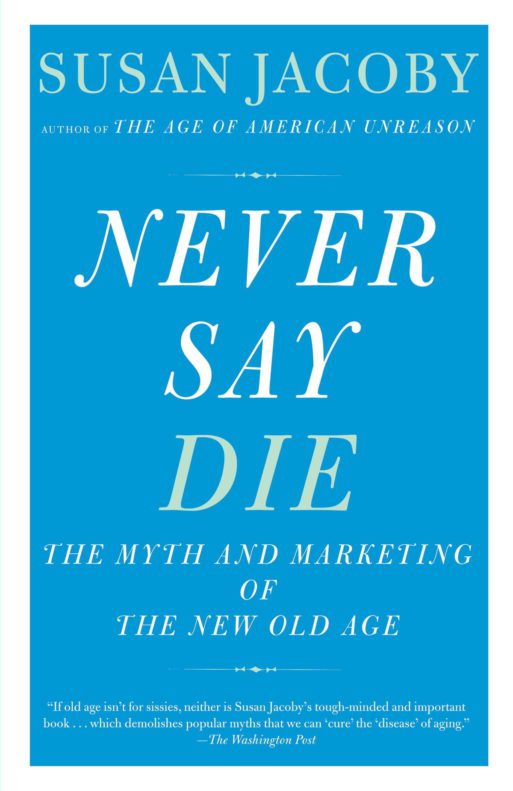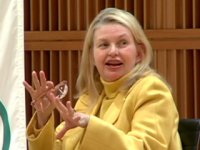 I hate the thought of old age and I do my best at keeping good care of my body. “Never Say Die” by Susan Jacoby tells us that no matter how much we exercise or how many supplements we take, we will all eventually become physically and mentally crippled by old age. Yes, there may be a few who will remain spry and alert as modern medicine keeps many of us alive into our 90’s, but most will succumb to the ravages of old age no matter what we do to avoid it. Susan Jacoby offers up to my Boomer generation a hard pill to swallow.
I hate the thought of old age and I do my best at keeping good care of my body. “Never Say Die” by Susan Jacoby tells us that no matter how much we exercise or how many supplements we take, we will all eventually become physically and mentally crippled by old age. Yes, there may be a few who will remain spry and alert as modern medicine keeps many of us alive into our 90’s, but most will succumb to the ravages of old age no matter what we do to avoid it. Susan Jacoby offers up to my Boomer generation a hard pill to swallow.
As in most things, economics (in this case, the boom of prosperity following WWII) is the starting point in explaining the social and psychological changes that led to the Boomers’ attitude of endless youth. As a Boomer, I was part of the generation that expected an ever- expanding economic pie. College was cheap and jobs were usually plentiful. Doing what one wanted, whether it was bumming around the world after college, “taking time off to join the counter-cultural bazaar”, quitting a job one didn’t like, or moving to a more satisfying career became common and acceptable. The Boomer culture believed in “the possibility of repeated self-reinventions – through therapy…religious conversion…and self-help. This sense of entitlement to change course was unlike the Depression era’s generation, who took a job or a marriage and stuck with it for life. Boomers broke the traditions of conventional society, including the idea of accepting one’s fate if you weren’t happy with it. The idea of finding the “right new path to overcome some of the more distressing and intractable realities of the human condition and life cycle” became commonplace.
As a Boomer, I was part of the generation that expected an ever- expanding economic pie.
“For many Boomers in their fifties and early sixties, the narcissistic component of the self-help movements” of their youth “fused with a faith in science and medicine.. both high tech and alternative, reinforce (their) determination to “defy” age. But no matter how young you try to think you are, there is no way to fool your aging and damaged DNA into thinking 80 is the new 60. The unstoppable effects of damage to the body caused by aging overwhelms the declining ability of the body to repair itself. Cell, tissue and organs become vulnerable to diseases and their function declines. No matter how young you think are, by the time you are 85, you will have a 50% chance of having serious dementia. “The prevalence of Alzheimer’s doubles in every five-year period after age sixty-five.”
And the inevitable problems of aging, whether physical, psychological or financial are going to be felt mainly by women since they live longer than men. Not only is the financial loss caused by taking time off for childbearing going to relegate women to more extreme financial problems as they get older, but lonesomeness caused by losing a spouse, isolation as friends die and social circles contract, and the effects of the maladies of aging will effect women more than men for the simple reason that they will live longer and have more time for all these problems to take their toll.
“The prevalence of Alzheimer’s doubles in every five-year period after age sixty-five.”
Susan Jacob
The fact is with ever-expanding lifespans, no one can be expected to be able to save enough money during their working years to support an ever-increasing period of old age. Considering that Americans are the lowest savers in the developed world, and that saving and investment has to start early in life (at a time when no one thinks of the need to save for old age,) most Americans will have little chance of building enough wealth for retirement.
The American concept of relying on the individual to take care of his or her retirement is reflected in shrinking or failing pensions being replaced by IRA’s, as well as cuts in social and medical programs for seniors. The author compares her European colleagues who are unconcerned about their transition towards retirement, and Americans’ general financial anxiety over the subject. Those high European taxes fund the social services required for taking care of the elderly. Americans have lower tax rates (envied by her European friends) but do not get the security of adequate funding of services for the elderly which they will soon be relying on. This raises a fundamental question: does society have an obligation to “legally force people to do what is in their long-term interest?” “There is a trade-off between liberty and security in almost every action of government, and that is certainly true of taxation to finance the lives of those who are too old to work…” The conflict between Liberals who favor collective measures to address social problems and Conservatives who value freedom from government intrusion is one of the major underlying differences between Liberals and Conservatives in the US.
The fact is with ever-expanding lifespans, no one can be expected to be able to save enough money during their working years to support an ever-increasing period of old age.
Then there is the issue of the ending of life. Some try to prevent death at all costs (one third of the Medicare budget is spent on the final year of life,) some want to end it when it is obvious that the end is near and ones’ quality of life is plummeting. A hospital is a very impersonal and expensive place to die, a hospice more palliative and economical. Providing help at home is cheaper than institutionalizing someone. The economic crisis of Medicare will probably force a change regarding using the latest expensive technology to prolong a life that often consists of pain and misery, or to accept the inevitable fact that death is imminent and palliative care, and gasp, aid-in dying will be seen as the more humane path to death.
The flip coin of the need to be allowed to decide to die when it is the best option is the movement to extend life through genetic means. There are a range of ethical issues to be asked before scientists find ways to extend what is now often, a low quality of life. As a Boomer grabbling with aging, this book really hit home, forcing me to see the realities that marketing works hard to hide from us.
Read our past posts on aging:
- Widows reflect on aging and dying. Helen Nearing and Joan Didion offer us their thoughts.
- American medicine is in denial of the need to reform end-of-life care for Boomer. “The Denial of Aging” by Muriel R. Gillick.
- Dr. Nader Shabahangi, president and CEO of AgeSong Institute opens up about elder care and our fear of aging.

 “Never say Die” by
Susan Jacoby
“Never say Die” by
Susan Jacoby




 First the Wealth Gap, Now the U.S. Has a Growing Health Gap
First the Wealth Gap, Now the U.S. Has a Growing Health Gap
 How to Comfort A Dying Loved One
How to Comfort A Dying Loved One
 Our Annual Seven Holiday Gifts for Someone Who Is Grieving, 2024 Edition
Our Annual Seven Holiday Gifts for Someone Who Is Grieving, 2024 Edition














